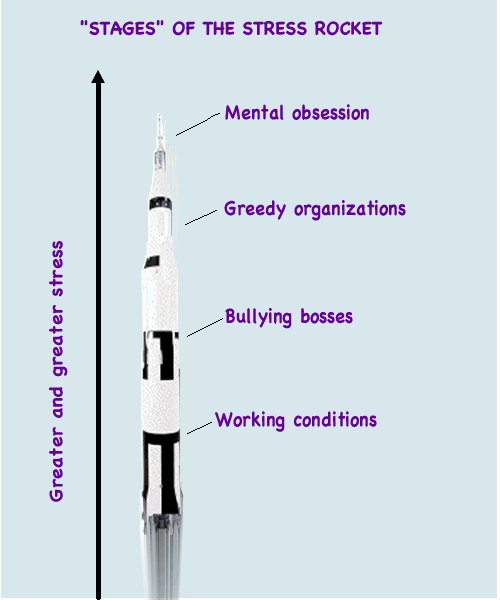News and Views: March 31st 2007
Ways to rejuvenate during your workday
Here are many different suggestions on how to refresh yourself during your work day, courtesy of The Ledger in Florida. As a birder, I especially like this one: put work out of your mind by listening to a tape of bird sounds. But the suggestions include breathing exercises, going to the gym, or just taking a walk. There’s also good advice that you should watch for any early signs of mounting stress—headaches, short tempers, trouble sleeping, and low morale—and act before it gets worse. [link]Tips for coping with stress at the office
Here are some more tips for coping with the kind of office environment that feels more like an extreme assault course of a survival exercise. The part on limiting distractions is something that anyone can do— but, oddly, many resist. I suggested similar ideas to a stressed person only today and got a decidedly luke-warm response. I wonder why? Maybe I touched on the fear that underlies people’s obsession with responding to every call or e-mail: the fear that if they don’t, they’ll be either left out, or miss something important. Rational? I don’t think so. [link]New generation, new ideas
Newsweek joined in the discussion about whether our current concerns with stress and overwork are due more ot the peculiar attitudes and habits of the Baby Boomer generation than anything inherent in work and the workplace. Looking at small, family-owned businesses, they claimed survey results show that:Unlike previous generations, for Gen Y work-life balance isn’t just something to strive for—it’s a given. In a Universum survey of 37,000 recent college grads, 59% pegged balancing their personal and professional lives as their top career goal.Then, perhaps conscious that this could be taken for a claim that young people are somehow lazy or feckless, they add: “. . . an interest in work-life balance doesn’t mean Gen Y’ers are resistant to working long hours—they just want to work differently.” It seems that meaningful work matters most. Interesting. [link]
Maybe you can’t have balance without boundaries
David Brewster thinks so, and he makes a persuasive case. Check it out. I especially warm to the idea that you need to establish boundaries around your expectations. I’m sure that over-active ambition leads to a great deal of frustration, when expectations rise to the point where they become impossible to match—especially when the boss has the expectations, and the staff are the ones who have to try to match them. [link]Stephen Covey on work/life balance
In the pages of Forbes, Stephen Covey has weighed in on the work/lie balance debate. He has a slightly different perspective, summarized as a concern that people rarely have very clear objectives about what they want, so finding a balance with other things becomes almost impossible. But he doesn’t confine his strictures to individuals. Here’s what he has to say about organizations:. . . there is another profoundly pervasive cause for work-life imbalance. It is to be found in the painful and surprisingly ineffective way most organizations work. In no way is this pain more clearly or practically manifest than their inability to focus and execute on their highest priorities.I think he’s right on that one. Covey adds:
Despite all our gains in technology, product innovation and world markets, most people are not thriving in the organizations they work for. They are neither fulfilled nor excited. They are frustrated. They are not clear about where the organization is headed or what its highest priorities are. They are bogged down and distracted. Most of all, they don’t feel they can change much. Can you imagine the personal and organizational cost of failing to fully engage the passion, talent and intelligence of the workforce? Can you imagine the waste of time, energy and resources?I very much agree. [link]
When less means more
The Courier-Mail in Australia says bluntly that:Working less is not only good for you. It can help save the environment and the push is on to slow us down.Or, at least, that is what the paper reports that Professor Tim Robinson from the Queensland University of Technology’s School of Economics says. He claims that working fewer hours not only improves quality of life, it reduces environmental damage.
The more we work, the more we contribute to traffic congestion, energy consumption in terms of electricity and air conditioning and deforestation from the amount of paper used.I hadn’t ever thought of Slow Leadership as an environmental movement, but the professor makes a persuasive case. Reader comments are interesting here. Not surprisingly, some people think that it’s easy for a professor to suggest working less, since he earns far more than they do. It’s that old economic trap again—do you prefer (or need) a better quality of life or more money? [link]
Priorities?
Here’s an interesting perspective on work/life balance, stated by a recent graduate interview by the Chicago Tribune:Work-life balance is very difficult to achieve in shorter time frames. I think of it instead as constant prioritization. If you prioritize correctly you will have balance over time.Maybe part of the frustration some people have with not getting the right work/life balance is caused by that constant bugbear of American culture: wanting it all and wanting it now. The curse of instant gratification may apply to work/life balance too. [link]
Laugh and the work world laughs with you
That’s the title of a posting on The Canadian’s blog. The writer, Craig Harrison, is a professional speaker and trainer, and offers a number of ways to bring humor and fun into the workplace, claiming that it can increase productivity, encourage creativity, enhance team building, and improve esprit de corps. See what you think. [link]Maybe it’s all a matter of perspective
That’s the idea of Will Herman, who claims that:. . . most statements like these [about work/life balance requirements] are vast oversimplifications of the situation. There is no one formula for balancing work and life - each person has their own and, like most things in life, it’s dynamic. Therein lies the challenge. You have to figure out what is best for you at any given time and try to make it work.In a follow-up posting, he tells his own story. Worth a look. [link] [via]
Labels: News








